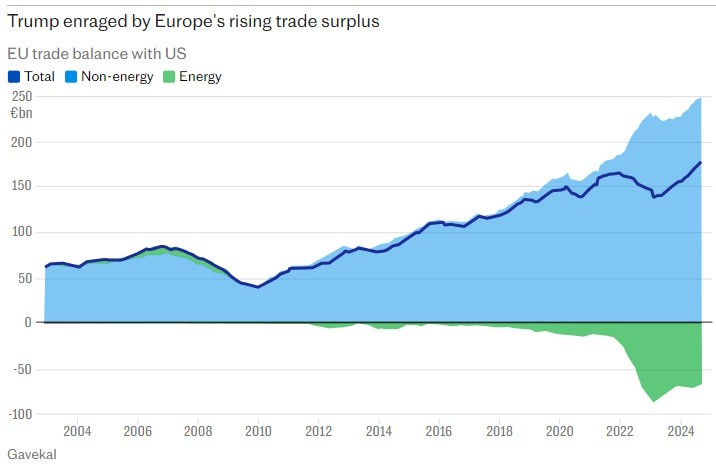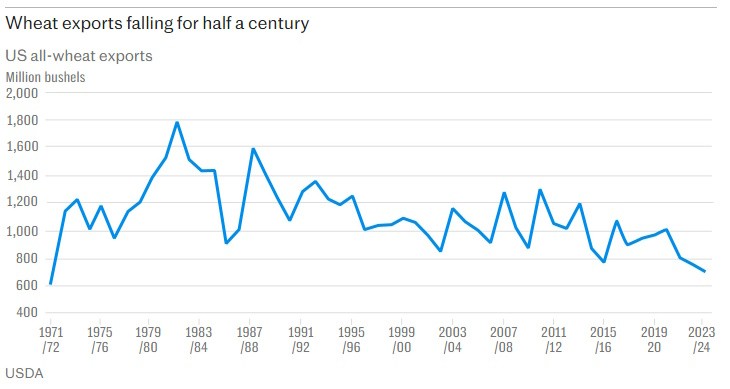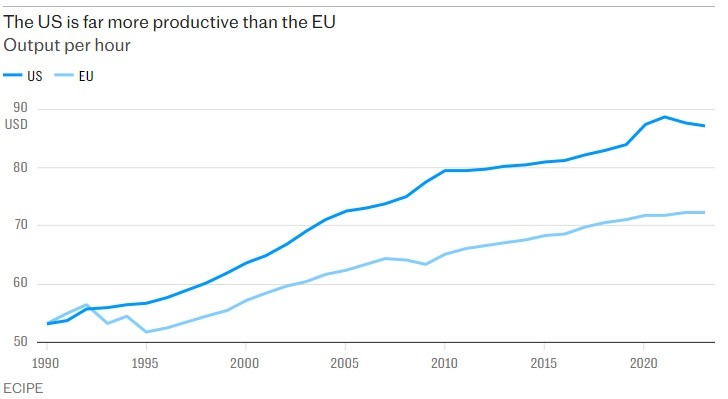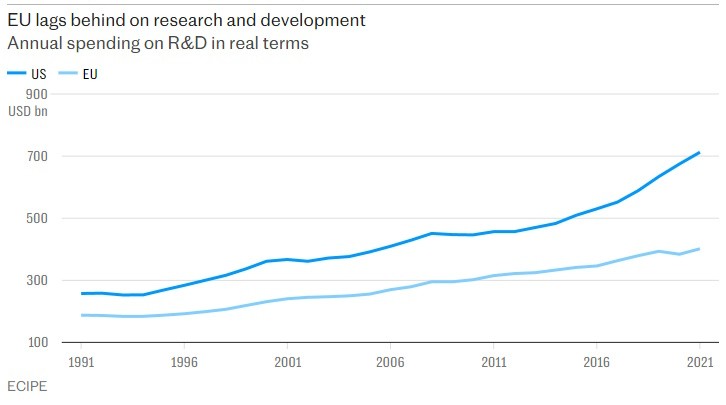Bruges Group Blog
The EU has blown it: even Labour now prefers a trade deal with America
The bloc must tear up its post-Brexit script or risk letting the US swoop in and carry Britain away
by Andrew Evans-Pritchard
If the EU seriously wishes to draw Britain closer into its commercial and political sphere, it will have to tear up the post-Brexit script and abandon the punitive pedantry of the last eight years.
Otherwise it risks letting Washington swoop in and carry away what is still the world's sixth biggest economy and a critical swing-player in the global contest for regulatory dominance. Brussels may discover that the Labour Party is less in thrall to EU nostalgia – and more Bevanite – than superficial opinion might suggest.
"The idea that we must choose between our allies, that somehow we're with either America or Europe, is plain wrong," said Sir Keir Starmer at the Lord Mayor's Banquet. "I reject it utterly. Attlee did not choose between allies."
Interpret that how you wish but his praise for Donald Trump was a warning to the Labour Movement for Europe that Sir Keir is not going to roll over and submit to EU satellite status without voting rights.
The Prime Minister and David Lammy have courted Trump's inner circle with a persistence that ought to give pause in Brussels. Labour is pressing ahead with free trade deals around the world, praising Britain's accession this month to the Pacific-Latin America trade pact (CPTPP) as a "great chance", and reopening trade talks with India enthusiastically.
Each deal precludes rejoining the EU single market, a point that some seem to have trouble understanding. Each new one also heads off "dynamic alignment" with EU rules yet further.
It has been my view for months that Labour would pursue a mid-Atlantic strategy, and also that it would be easier to bargain with Donald Trump than with Joe Biden, who was never going to do trade deals with anybody.
Trump is surrounding himself with economic appointees who can loosely be described as pro-British. Jamieson Greer, his pick for trade chief, wants America to pursue closer bilateral deals with countries that are geopolitically aligned, listing the UK as a "good start".
The Heritage Foundation's Project 2025 is explicit, saying "trade with the post-Brexit UK needs urgent development before London slips back into the orbit of the EU". Trump is packing his team with the key authors of this document.
A Brexit enthusiast is to head the National Economic Council. Kevin Hassett is a free-trading champion of reciprocal tariffs: they do it to you, you retaliate in equal measure. It is a variant of the "escalate to de-escalate" strategy expounded by incoming treasury secretary, Scott Bessent.
Britain could be tangled up in this – we have 10pc tariffs on cars, the US has 2.5pc tariffs (why not just get rid of the tariffs?) – but overall trade with the US is roughly balanced. It is the EU that raises Trump's blood pressure, with a structural bilateral surplus heading for $230bn this year.
It is impossible to predict how Trump will behave but he might well relish drawing the UK away from the EU, and might even cut some slack on the most neuralgic aspects of farm trade.
Note that the US has been running a trade deficit in agricultural goods for several years, rising to a record $40bn this year. It no longer produces enough to feed itself. The presumption that US farm goods would flood Britain is one of the many outdated myths that pollute this debate.
In short, Labour is pursuing a non-aligned trade policy that seeks the freest exchange that is reasonably possible with the whole world. It is the CPTPP spirit. It is not pursuing EU alignment.
The EU should stop thinking it can trickle out "concessions" in exchange for what it deems to be good behaviour, and should stop dishing out lectures on cherry-picking. It is in no fit state to impose terms on anybody.
The European project has failed as an economic experiment. This brutal truth has yet to percolate through all Labour ranks or shift what one might loosely call the BBC narrative, but the facts are so staggering that it must soon intrude on internal British politics.
The eurozone has seen hardly any growth for a quarter century. Per capita GDP in the EU as a whole is $40,800 compared to $81,700 in the US. The EU's Draghi report says real disposable income per person has grown almost twice as fast in America since 2000. "Europe is stuck in a static industrial structure," says the report.
From my angle of view covering the world economy, the EU looks like a mid-tech backwater at risk of accelerating decline. It has no credible answer to this and is mostly making matters worse. It has killed Europe's nascent AI industry by treating it as a threat. The US and the UK are running away with nuclear fusion while the EU argues over how safe it is. Europe is driving away its AI-tech start-ups. The Northvolt bankruptcy confirms that Europe cannot build batteries at viable cost.
The EU is a generation behind China on electric vehicles. Its plan to double the EU's share of global semiconductor output to 20pc by 2030 is a delusional bet on yesterday's technology. Its hydrogen strategy is misdirected towards the wrong goals and is certain to be an exorbitant white elephant, perpetuating the EU's energy crisis instead of solving it. Brussels is the kiss of death to everything it touches.
There is absolutely no future for the UK in betting on that obsolete model. Let us turn the debate around: it is the EU that faces a hard choice avoided until now. It will have to decide whether to persist in treating the UK as an apostate on probation or treat it as a sovereign state on equal terms.
If the latter, it can start to deliver this immediately by – for example – granting mutual recognition of "conformity assessment", allowing bodies in the UK to test and certify products heading for the EU market.
That is a normal courtesy. It exists in EU trade deals with Australia, Israel or Canada. The refusal to grant this in the Brexit deal was a hostile act – one of many (don't get me started on Galileo, ITER, etc).
If Brussels wants to avoid solidifying a London-New York-Singapore triple dominion over global finance, it would be well-advised to stop denying the UK "equivalence" in financial services right now.
The UK in turn should apply to join the Pan-Euro-Mediterranean Convention (PEM). It creates a common "rules of origin" club between the EU, North Africa, the Levant, the Balkans, Ukraine and Georgia, allowing for "diagonal cumulation" in meeting content rules.
"It's the most obvious low-hanging fruit. It makes it much easier to take advantage of the free trade agreement and it has no effect on sovereignty," said Professor Lorand Bartels, chairman of the UK Trade and Agriculture Commission. If Brussels is difficult over this, there is little point even talking to them.
In the end there are limits. The doctrinal sanctity of the EU single market gets in the way of everything. Brussels has just created the new post of defence commissioner, putting the whole area of military procurement and defence cooperation under the EU's law-making machinery. Did the European Commission realise that this would push Britain further into the arms of America?
One day there will be a post-mortem debate within EU policy circles: how did they lose Britain over Brexit, and how did they compound the error by losing a pro-European Labour Government?
Originally published in the Daily Telegraph
https://www.telegraph.co.uk/business/2024/12/03/eu-blown-it-even-labour-prefers-a-trade-deal-with-america/
Contact us
246 Linen Hall, 162-168 Regent Street
London W1B 5TB
Director : Robert Oulds MA, FRSA
Founder Chairman : Lord Harris of High Cross









